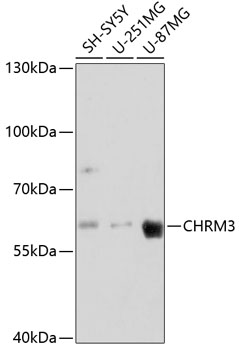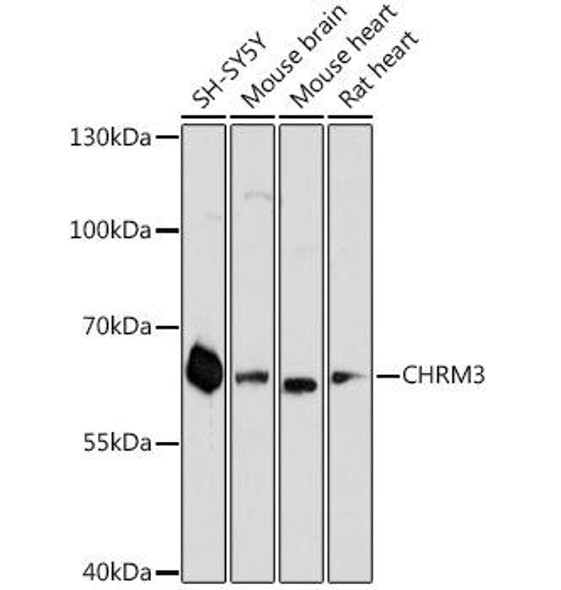Cell Biology Antibodies 5
Anti-CHRM3 Antibody (CAB14560)
- SKU:
- CAB14560
- Product Type:
- Antibody
- Reactivity:
- Human
- Host Species:
- Rabbit
- Isotype:
- IgG
- Antibody Type:
- Polyclonal Antibody
- Research Area:
- Cell Biology
Description
| Antibody Name: | Anti-CHRM3 Antibody |
| Antibody SKU: | CAB14560 |
| Antibody Size: | 20uL, 50uL, 100uL |
| Application: | WB |
| Reactivity: | Human |
| Host Species: | Rabbit |
| Immunogen: | Recombinant fusion protein containing a sequence corresponding to amino acids 390-475 of human CHRM3 (NP_000731.1). |
| Application: | WB |
| Recommended Dilution: | WB 1:500 - 1:2000 |
| Reactivity: | Human |
| Positive Samples: | SH-SY5Y, U-251MG, U-87MG |
| Immunogen: | Recombinant fusion protein containing a sequence corresponding to amino acids 390-475 of human CHRM3 (NP_000731.1). |
| Purification Method: | Affinity purification |
| Storage Buffer: | Store at -20'C. Avoid freeze / thaw cycles. Buffer: PBS with 0.02% sodium azide, 50% glycerol, pH7.3. |
| Isotype: | IgG |
| Sequence: | QVPE EELG MVDL ERKA DKLQ AQKS VDDG GSFP KSFS KLPI QLES AVDT AKTS DVNS SVGK STAT LPLS FKEA TLAK RFAL KTRS QI |
| Gene ID: | 1131 |
| Uniprot: | P20309 |
| Cellular Location: | Basolateral cell membrane, Cell junction, Cell membrane, Multi-pass membrane protein, postsynaptic cell membrane, synapse |
| Calculated MW: | 66kDa |
| Observed MW: | 63kDa |
| Synonyms: | CHRM3, EGBRS, HM3, PBS |
| Background: | The muscarinic cholinergic receptors belong to a larger family of G protein-coupled receptors. The functional diversity of these receptors is defined by the binding of acetylcholine and includes cellular responses such as adenylate cyclase inhibition, phosphoinositide degeneration, and potassium channel mediation. Muscarinic receptors influence many effects of acetylcholine in the central and peripheral nervous system. The muscarinic cholinergic receptor 3 controls smooth muscle contraction and its stimulation causes secretion of glandular tissue. |
| UniProt Protein Function: | mAChR M3: The muscarinic acetylcholine receptor mediates various cellular responses, including inhibition of adenylate cyclase, breakdown of phosphoinositides and modulation of potassium channels through the action of G proteins. Primary transducing effect is Pi turnover. Defects in CHRM3 are the cause of Eagle-Barrett syndrome (EGBRS). EGBRS is a syndrome characterized by thin abdominal musculature with overlying lax skin, cryptorchism, megacystis with disorganized detrusor muscle, and urinary tract abnormalities. Belongs to the G-protein coupled receptor 1 family. Muscarinic acetylcholine receptor subfamily. CHRM3 sub-subfamily. |
| UniProt Protein Details: | Protein type:Membrane protein, multi-pass; GPCR, family 1; Membrane protein, integral; Receptor, GPCR Chromosomal Location of Human Ortholog: 1q43 Cellular Component: asymmetric synapse; postsynaptic membrane; basolateral plasma membrane; integral to plasma membrane; dendrite; plasma membrane; nerve terminal; cell junction Molecular Function:protein binding; receptor activity; drug binding; acetylcholine binding; phosphoinositide phospholipase C activity; G-protein coupled acetylcholine receptor activity Biological Process: nervous system development; cell proliferation; G-protein coupled receptor protein signaling pathway; acetylcholine receptor signaling, muscarinic pathway; smooth muscle contraction; regulation of vascular smooth muscle contraction; energy reserve metabolic process; protein modification process; positive regulation of smooth muscle contraction; signal transduction; regulation of insulin secretion; saliva secretion Disease: Abdominal Muscles, Absence Of, With Urinary Tract Abnormality And Cryptorchidism |
| NCBI Summary: | The muscarinic cholinergic receptors belong to a larger family of G protein-coupled receptors. The functional diversity of these receptors is defined by the binding of acetylcholine and includes cellular responses such as adenylate cyclase inhibition, phosphoinositide degeneration, and potassium channel mediation. Muscarinic receptors influence many effects of acetylcholine in the central and peripheral nervous system. The muscarinic cholinergic receptor 3 controls smooth muscle contraction and its stimulation causes secretion of glandular tissue. [provided by RefSeq, Jul 2008] |
| UniProt Code: | P20309 |
| NCBI GenInfo Identifier: | 113125 |
| NCBI Gene ID: | 1131 |
| NCBI Accession: | P20309.1 |
| UniProt Secondary Accession: | P20309,Q0VAJ8, Q4QRI3, Q5VXY2, Q9HB60, |
| UniProt Related Accession: | P20309 |
| Molecular Weight: | 590 |
| NCBI Full Name: | Muscarinic acetylcholine receptor M3 |
| NCBI Synonym Full Names: | cholinergic receptor, muscarinic 3 |
| NCBI Official Symbol: | CHRM3 |
| NCBI Official Synonym Symbols: | HM3; EGBRS |
| NCBI Protein Information: | muscarinic acetylcholine receptor M3; m3 muscarinic receptor; acetylcholine receptor, muscarinic 3 |
| UniProt Protein Name: | Muscarinic acetylcholine receptor M3 |
| Protein Family: | Muscarinic acetylcholine receptor |
| UniProt Gene Name: | CHRM3 |
| UniProt Entry Name: | ACM3_HUMAN |







